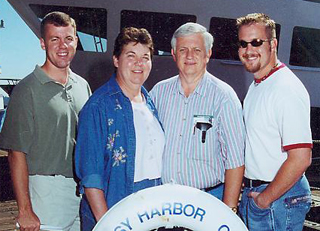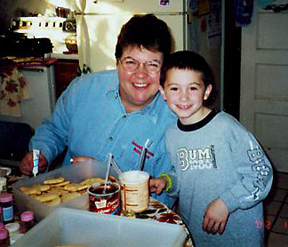 |
Mary Filipi, Ph.D., and her husband Bill, are flanked by their sons, Eric, left, and Aaron, right. |
Today, the 53-year-old self-proclaimed “late bloomer” is graduating with a doctoral degree in neuroscience though the Medical Science Interdepartmental Area in UNMC’s Graduate Studies.
“I never, ever visualized having a Ph.D., but I’m really happy it ended up this way,” she said. “If you would have asked me 20 years ago, I would have said no, there’s not a chance.
But, it seems the stars have been aligned from the beginning. Dr. Filipi comes from an educated family and has had many people who nudged her along the way including UNMC College of Nursing Associate Professor Kate Fiandt, D.N.Sc., and former UNMC neurologist Rifaat Bashir, M.D.
Her husband was always supportive of her pursuing degrees, and she said, her children grew up thinking all mothers went to school. As a result, Dr. Filipi has a nursing diploma, bachelor’s degree in nursing, master’s degree in nursing and is a certified nurse practitioner.
“My husband and (two grown) sons just smiled and nodded,” she said, when she told them she was going to pursue a doctoral degree.
Dr. Filipi’s children were young – 2 and 3 – when they’d hear the fire department rescue phone ring and head for the car with her, she said, because their father farmed.
“We’d jump in the car and ride,” Dr. Filipi said. “They went on emergency calls with me, and sometimes in a crisis situation, riding in the ambulance, belted in the front seat. Now you could never do something like that. But it was a town of 350 people. Everyone knew each other. We worked together to help each other.”
When Dr. Filipi began the program she was determined that it not interfere with her family life. Her husband works evenings, which worked out, because she studied in the evenings. But the last four months of the program took a lot of weekend work.
“My family’s been a wonderful support for me,” she said. “I come from a large family. I’d call them up and vent because there were a lot of tears through this. I don’t know if I could have gotten through this without them, particularly my three sisters.
“I have an 85-year-old aunt, Luci, a retired school teacher, who calls me on a regular basis. She would say, now where are we and when are we going to be done? She’s going to be at my graduation, along with my mother.”
So how difficult have the past seven years been? It depended on which day you asked, she said.
 |
Mary Filipi, Ph.D., frosting Christmas cookies with her nephew, Cody Filipi. |
Dr. Filipi was 17 years old when she started a nursing program in Lincoln. She arrived at UNMC about 20 years ago to run the former University Medical Associates (UMA) Harvey Oaks family practice clinic, now the UMA clinic in Clarkson West Medical Center building.
Dr. Filipi praised UNMC’s scholarship program, which she said enabled her to earn all her degrees while an employee. “I doubt if it would have happened otherwise,” she said. “Working here was probably one of my best blessings. I wouldn’t have been able to go to school otherwise. They pay a majority of the tuition. It was the most wonderful gift.”
As a nurse practitioner in UNMC’s multiple sclerosis clinic, Dr. Filipi hopes through research, she will be able to improve the quality of life of her patients.
Dr. Filipi said she’s always been interested in clinical research. “Our MS patient population is poorly understood,” she said. “I would have to say they are the main reason I went on. I also wanted UNMC and myself to have more credibility on the national front. I’m also a strong believer that research should happen where the care does, and shouldn’t be looked on as physician driven, but team driven.”
She and fellow nurse practitioner, Kathy Healey, take care of about 1,200 multiple sclerosis patients in the clinic. “The patient population is phenomenal,” she said. “They’re the most wonderful group of people I’ve ever met in the 30-plus years of nursing. I found my niche and I don’t ever want to leave it until I retire.”